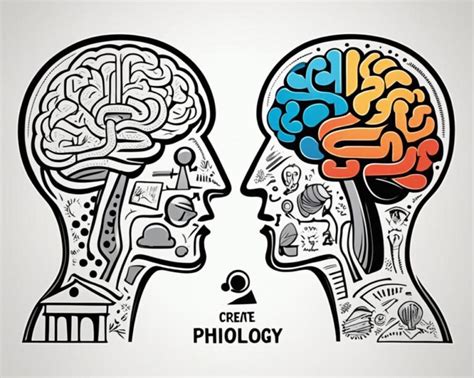Introduction
Psychology and philosophy have long been intertwined disciplines, each exploring different aspects of the human experience. Psychology focuses on the scientific study of behavior and mental processes, while philosophy grapples with fundamental questions about existence, knowledge, and values. This article delves into the distinctive characteristics, methodologies, and areas of inquiry of these two fields, highlighting their similarities and divergences.

Distinctive Characteristics
Psychology primarily adopts an empirical approach, utilizing research methods such as experiments, surveys, and observations to investigate mental phenomena. The field has developed a rich body of knowledge on topics ranging from perception and learning to personality and social behavior. In contrast, philosophy relies on rational inquiry and logical reasoning to explore abstract concepts and philosophical problems. It seeks to uncover the underlying principles that govern existence, reality, and human thought.
Methodological Approaches
Psychology’s experimental and observational methods allow for the collection and analysis of quantifiable data, enabling researchers to test hypotheses and formulate theories. Philosophy, on the other hand, employs a variety of techniques, including:
- Deductive reasoning: Drawing conclusions from general premises.
- Inductive reasoning: Inferring general principles from specific observations.
- Thought experiments: Analyzing hypothetical scenarios to explore philosophical concepts.
Areas of Inquiry
Psychology encompasses a broad spectrum of subfields, including:
- Cognitive psychology: Studies mental processes such as attention, memory, and decision-making.
- Developmental psychology: Examines human development from infancy to adulthood.
- Social psychology: Explores the influence of social factors on behavior and cognition.
Philosophy, while covering a wider range of topics, can be broadly divided into:
- Metaphysics: Questions about the nature of reality, time, and space.
- Epistemology: Studies knowledge and its limits.
- Ethics: Examines moral principles and values.
- Political philosophy: Investigates the nature of government and justice.
Overlapping Concepts
Despite their distinct approaches, psychology and philosophy share several fundamental concepts:
- Consciousness: The subjective experience of one’s own thoughts, feelings, and perceptions.
- Mind: The cognitive and emotional aspects of an individual.
- Free will: The ability to make choices and control one’s actions.
- Value: The importance or worth attributed to something.
Historical Connections
The relationship between psychology and philosophy has evolved over time. Psychology emerged as a separate discipline from philosophy in the 19th century, but the two fields continue to influence each other. Figures like Sigmund Freud and William James played pivotal roles in bridging the gap between these disciplines.
The Role of Interdisciplinary Collaboration
Collaboration between psychology and philosophy has fostered innovative insights and advancements in both fields. Psychologists have applied philosophical concepts to understand the nature of consciousness and the development of moral reasoning. Philosophers have utilized psychological research to inform their theories on free will and the nature of knowledge.
Practical Applications
The combined insights of psychology and philosophy have practical applications in various fields:
- Education: Understanding cognitive processes and learning styles enhances educational practices.
- Healthcare: Exploring the psychological factors influencing health and disease improves patient outcomes.
- Social policy: Insights into human behavior and social interactions inform policy decisions on issues such as crime, poverty, and social justice.
Tables Summarizing Key Points
| Attribute | Psychology | Philosophy |
|---|---|---|
| Approach | Empirical (experiments, surveys, observations) | Rational inquiry (deduction, induction, thought experiments) |
| Focus | Behavior and mental processes | Fundamental questions about existence, knowledge, and values |
| Methods | Hypothesis testing, data analysis | Logical reasoning, conceptual analysis |
| Subfields | Cognitive, developmental, social | Metaphysics, epistemology, ethics, political philosophy |
| Overlapping Concepts | Consciousness, mind, free will, value | |
| Practical Applications | Education, healthcare, social policy | Understanding human nature, informing ethical decision-making |
FAQs
1. Can psychology answer all questions about human behavior?
While psychology provides valuable insights into behavior, it has limitations due to its focus on observable phenomena. Many aspects of human experience, such as spiritual beliefs and mystical experiences, may remain outside the scope of scientific inquiry.
2. Is philosophy useless in practical life?
Philosophy plays a crucial role in developing critical thinking, ethical reasoning, and a deep understanding of the human condition. These skills are essential for navigating complex social and personal issues, making philosophy highly relevant in everyday life.
3. Which field is more difficult, psychology or philosophy?
Both psychology and philosophy present unique challenges. Psychology requires a strong foundation in scientific methods and statistical analysis, while philosophy demands rigorous logical and conceptual reasoning abilities. The difficulty level depends on one’s individual strengths and preferences.
4. What are some careers that combine psychology and philosophy?
Fields that blend psychology and philosophy include:
- Cognitive science
- Clinical neuropsychology
- Philosophy of mind
- Social and political philosophy
- Bioethics
- Counseling psychology
Conclusion
Psychology and philosophy, though distinct in their approaches and areas of inquiry, share a deep connection in exploring the human experience. Interdisciplinary collaboration between these disciplines has led to breakthroughs and practical applications, enriching our understanding of ourselves and the world around us. As we continue to grapple with fundamental questions and complex societal challenges, the insights of both psychology and philosophy remain indispensable in shaping our knowledge, values, and actions.
